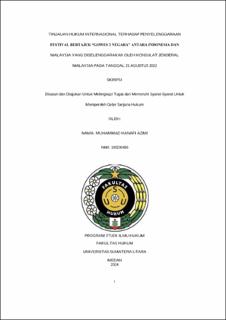| dc.description.abstract | Bilateral relations are generally deformed as relations between two countries with the aim
of enhancing harmony and bonding between the two countries. These bilateral relations have
their roots in the history of the relationship between kings and kingdoms, including the concept
of Ambassadors in the Middle East, Ancient Egypt, India, China, and Malaysia around the 16th
century. Bilateral relations, like Consular Relations, between Indonesia and Malaysia, have been
established long after Malaysia's independence in 1957. Indonesia and Malaysia are two
countries that share and are friendly to each other from various sides, ranging from politics,
culture, State borders, etc. Friendly relations between the two countries are listed in Article 1
paragraphs 2 and 3 of the UN Charter, which contains the development of friendly relations
based on respect for the principles of equal rights and self-determination.
The 1961 Vienna Convention Article 3 paragraph 1 part E & the 1963 Vienna
Convention Article 5 parts B and C explicitly explain the friendly relations between the two
countries by developing these relations through. the fields of education, commerce, and most
importantly in the field of culture. The “Gowes 2 Negara” Festival was held to commemorate 65
years of relations between Indonesia and Malaysia, especially between the Medan City
Government and the Consulate General of Malaysia. The “Gowes 2 Negara” Festival was
attended by both locals and foreigners and the event featured cultural attractions from both
countries.
The method used in writing this thesis is normative juridical research, namely secondary
data collection including primary, secondary, and tertiary legal materials obtained from laws and
regulations, books, electronic/internet media sources. The data analysis used is a qualitative data
analysis method.
Based on this, the author can conclude that Indonesia-Malaysia were two friendly
countries that have a long history of bilateral relations. The 1963 Vienna Convention and the
1961 Vienna Convention explicitly explain the friendly relations between the two countries.
Indonesia and Malaysia cooperate not only bilaterally, but also regionally and even multilaterally
with the aim of negotiating matters of mutual interest. | en_US |


